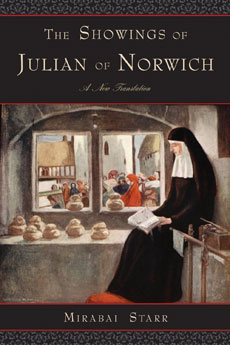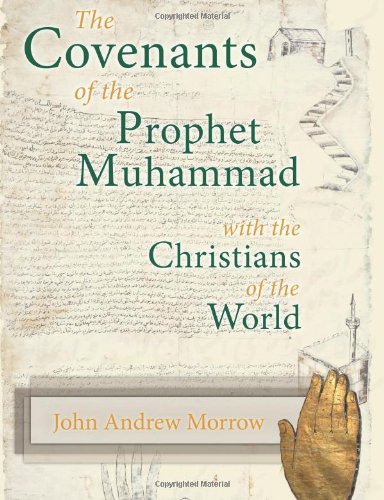Every Christmas we’re treated to a slew of articles and blog posts and books about the “real” Santa Claus. We love to try to get behind the modern, secular, commercial mythology and discover the “true” Christian foundation of Jolly Old Saint Nick.… [Read more…] about Santa Claus, Saint Nicholas and Modern Mythology
Review: "The Showings of Julian of Norwich"
Julian of Norwich freaks me out. Are her writings actual supernatural revelations from God as conveyed to a 14th-century English woman? Or merely fever-induced hallucinations that should be set aside in favor of a safer orthodoxy? Reading Julian and pondering these possibilities leaves me with a sense of unease and exhilaration not far removed from the feeling induced by that delicious pause at the top of a roller coaster.
What weight should we give to the spiritual visions of a woman living in the Middle Ages? If someone today had such experiences, we’d refer her to a psychiatrist, not pore over her words seeking spiritual truth. Does God really reveal himself in such ways? Is there divine truth contained in these 600-year-old words?
Mystical versions of Christianity confound me — they’re simply not part of my personal experience — and I think it’s wise to evaluate such accounts of the supernatural with a generous dose of skepticism. But despite my misgivings, Julian’s thoughts still resonate with me, as they have with so many others over the centuries. Her words merit critical reflection and offer important challenges to common conceptions of God.
Julian’s biography is thin — we don’t even know her real name, only that she was born in England in the mid-14th century, and that, at the age of 30, she was taken ill, and while near-death she experienced sixteen visions, or “showings” from God. She went on to become an anchoress, dedicating her life to God through… [Read more…] about Review: "The Showings of Julian of Norwich"
Keep the X in Xmas
I recently created this meme for the Unfundamentalist Christians Facebook page:
The intent of this picture was to refute the silly notion that replacing “Christ” with an “X” is part of a sinister plot against Christianity.
The truth of the matter is that abbreviating nomina sacra (sacred names) is a tradition that dates to the earliest days of Christianity. To preserve space and save valuable writing resources, scribes often used such abbreviations for references to God and Christ, usually by writing only the first and last letter of a word with a bar across the top.
In the meme above I included a transcription from Codex Sinaiticus, a 4th century manuscript of the Bible. Here’s the actual text from Matthew 16:16b as it appears in Sinaiticus:
In this verse we find three nomina sacra: ΧC, short for χριστὸς (Christ); ΥC, short for υἱὸς (son); and ΘΥ, short for θεοῦ (God). If you’re reading carefully you’ll notice that the letters in the abbreviations don’t seem to quite match up with the letters from the full word. That’s because Siniaticus is written entirely in uppercase letters, also known as uncials. Just as in English, many of these letters change form from uppercase to lowercase. In the nomina sacra above, C is an uppercase sigma (ς) and Υ is an uppercase upsilon (υ).
But enough with the Greek lesson. The important point is that the Greek letter X has been used as a substitute for the name of Christ since Christians started writing the… [Read more…] about Keep the X in Xmas
The "War on Christmas" from a retailer's point of view
This guest post is by J. Howard Boyd.
As we enter the holiday shopping season, I would like to call out a few points about the whole “Merry Christmas” vs. “Happy Holidays” debate.
This is an extremely stressful season for those of us who make our living in the retail marketplace. Most of us rely on sales from this season to make up for the poorer sales that occur throughout the rest of the year. Many of my customers this season I see throughout the year, but the vast majority will be people I see only once a year, if that.
My biggest pleasure in serving you this season will be to help you find just the right gift for that special someone on your list. In order to do that, I will have to learn some things from you about the intended recipient. I will ask about their likes and dislikes, but I probably won’t ask about their religion, and I certainly won’t be asking you about yours. It’s just not relevant to the task at hand (and there are a lot of other people whom I also need to help!)
At the end of our time together, hopefully I will be tallying up your purchase. As we both are aware, this is a season of giving as well as shopping, so I may take the opportunity to wish you well as you go on your way. If you made it clear to me in our conversation that you are a Christian, I will probably wish you a Merry Christmas. If you have indicated you are Jewish, I may say Happy Chanukah. If you have shared that you are a Pagan, I will wish you Good Yule, or Happy… [Read more…] about The "War on Christmas" from a retailer's point of view
Review: "The Covenants of the Prophet Muhammad with the Christians of the World"
In the West, Islam is popularly depicted as a religion rooted in hate and violence, as a belief system inherently antagonistic towards other religions — particularly Christianity — and as synonymous with terrorism and totalitarian theocratic rule.
But there is another face of Islam, a face that garners little attention on the evening news and is virtually ignored by those who traffic in — and profit from — divisive fear mongering. This is an Islam practiced by millions around the world, an Islam defined not by violence but by respect, an Islam that remains true to its founder’s revelation.
In The Covenants of the Prophet Muhammad with the Christians of the World (Angelico Press), John Andrew Morrow sets out to offer concrete textual reasons, from the Prophet Mohammed himself, for an understanding of Islam that moves beyond stereotypes and reasserts the truly inclusive foundations of Islamic belief.
Morrow presents six covenants written by Muhammad to Christian communities and argues that these letters and treaties, which proclaim and define peaceful and mutually respectful relationships with Christians, have the potential to serve as a foundational source of Islamic belief and practice, on equal footing with the Koran and the hadiths.
Bringing modern historical scholarship and textual criticism to bear in his study of these rare and largely forgotten documents, Morrow refutes the notion that Muslims and Christians necessarily stand at odds with one another,… [Read more…] about Review: "The Covenants of the Prophet Muhammad with the Christians of the World"
The American Family Association wants Christians to boycott Radio Shack. But WWJD?
The American Family Association is calling for a boycott of Radio Shack. Why? Because in their holiday advertising Radio Shack uses the word holiday instead of Christmas.… [Read more…] about The American Family Association wants Christians to boycott Radio Shack. But WWJD?
Why would Catholics and Protestants argue over this?
Any discussion of Catholic and Protestant relations usually ends up focusing on a short list of issues: the Pope, Mary, justification, and, of course, purgatory.… [Read more…] about Why would Catholics and Protestants argue over this?
When Jesus and Satan shared a name
Halloween is gone till next year.
Speaking of the devil, did you ever wonder why he’s named Lucifer? There are two competing theories about that:
Theory #1: Lucifer is not the name of the devil.
Isaiah 14:12 describes the fall of a Babylonian king (How you have fallen from heaven, / morning star, son of the dawn! / You have been cast down to the earth, you who once laid low the nations!) The original Hebrew word used for “morning star” there is הֵילֵל (helel). When, in 400 A.D., Jerome translated the Bible into his masterful Latin-language Vulgate edition, he translated helel into lucifer, a Latin word meaning “the morning-star; the planet Venus.” Later, early English translations, such as the King James Version, kept the word lucifer right where Jerome had it—only this time they capitalized it, transforming it into a proper name. So then we got, How art thou fallen from heaven, O Lucifer, son of the morning! …
Here’s where it gets interesting. In the Vulgate, the word lucifer appears again. This time it’s in 2 Peter 1:19, where it is clearly denotes Jesus. Well, the KJV translators didn’t want to do there with that word what they had done with it back in Isaiah—they didn’t want to call Jesus Lucifer. So for they reverted back to the original translation of the word, and in 2 Peter 1:19 the world was given “… until the day dawns and the morning star… [Read more…] about When Jesus and Satan shared a name
Five reasons why "God works out all things for those who love him" is awful advice
I recently received this letter:
John,
I am a follower of your blog as well as a huge fan of Unfundamentalist Christians.
I was raised in an Evangelical home and was schooled at an Evangelical Christian school for most of my life. I have slowly begun to discover my own faith, as opposed to just simply believing what I had been told all my life.… [Read more…] about Five reasons why "God works out all things for those who love him" is awful advice
A Bible-based "hotline" that's no help at all.
The meme above crossed my Internet path today. I was going to print it out and hang it on my refrigerator next to my plumber’s name and number—except then I realized that while my plumber can actually help me, this list of Bible verses is more likely to hurt rather than to help me or anyone else.
Let’s take a look at the actual Biblical text behind these “hotlines”:
Worry Hotline ….. 1 Peter 5:7
1 Peter 5:7 reads:
Cast all your anxiety on him because he cares for you.
This is fine for what it is. But it does nothing to address any real issue in anyone’s life. “Stressed about your job, your spouse, your money, your kids, your health? No worries: God cares for you!” Comfort fail.
Fear Hotline ….. Isaiah 41:10
Isaiah 41:10 reads:
So do not fear, for I am with you; do not be dismayed, for I am your God. I will strengthen you and help you; I will uphold you with my righteous right hand.
This Old Testament verse certainly sounds good. And I do think that God can provide such encouragement to us. But that’s not the message being delivered here. This is written to the nation of Israel, not to individual Christians. Appropriating God’s words to Israel as a personal antidote against fear is Biblically dishonest. It’s either disingenuous or ignorant to pull a Bible verse entirely out of its context and then use it to convey your own thoughts and feelings.
Temptation Hotline ….. 1 Corinthians 10:13,… [Read more…] about A Bible-based "hotline" that's no help at all.







